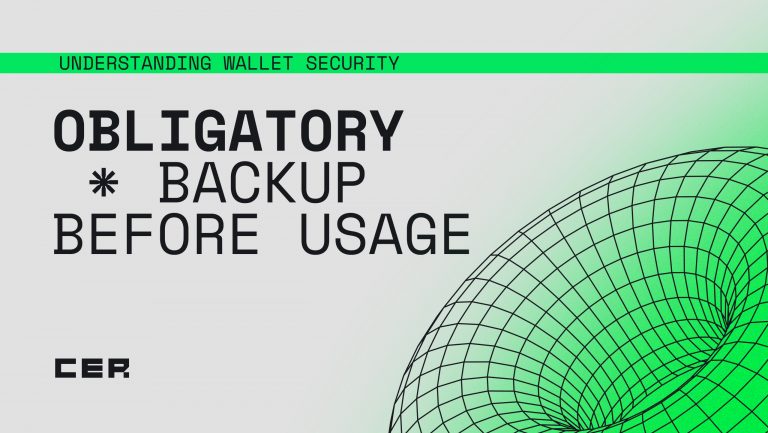Understanding wallet security: Obligatory Backup Feature

Let’s explore what obligatory backup entails, why it is important, and how it influences the overall security of your wallet. Additionally, we will highlight a concerning statistic and emphasize the significance of incorporating obligatory backups into a wallet design.
The importance of obligatory backup
A crypto wallet backup refers to the process of securely storing a copy of your wallet’s seed phrase or private keys. These backups act as a fail-safe mechanism, ensuring that you can regain access to your funds in case of device loss, damage, or any other unforeseen circumstances.
Alarming statistics
A recent security report conducted by the CER Research Team revealed an alarming trend. Out of all the mobile apps analyzed in the current version of the Wallet Security Rating, a staggering 45% include the obligatory backup feature before engaging in any other wallet activity. This functionality is often discarded as an unnecessary step before a user can fully immerse themselves in the world of cryptocurrencies, but the lack of it puts their funds at risk.
Understanding the obligatory backup
An obligatory backup refers to the process of creating a secure copy of your wallet’s seed phrase or private keys. By backing up this crucial information, you decrease the risk of potential threats such as device loss, malware attacks, or hacking attempts.
Benefits and drawbacks of the obligatory backup
- Enhanced Security: By creating an obligatory backup, users significantly reduce the risk of permanently losing their crypto assets due to unforeseen circumstances.
- Portability and Flexibility: With a backup in place, users can easily switch between wallets, upgrade devices, or recover lost wallets, knowing that their funds are safe and accessible.
- Peace of Mind: Reliability of your ability to securely store the seed phrase can reduce third-party risks, but it may also lead to anxiety regarding its proper storage. The knowledge that your digital assets are protected by a secure backup alleviates concerns and allows users to confidently navigate the crypto world.
While obligatory backup is an essential security measure for crypto wallet users, it is important to acknowledge that it may have certain disadvantages. These include:
- User negligence: Despite the importance of performing backups, some users may neglect to create them or fail to follow proper backup procedures.
- Physical storage risks: Storing the backup in a physical location, such as a written seed phrase or a hardware device, introduces the risk of theft, damage, or loss. If the backup is not adequately protected, it can fall into the wrong hands or become inaccessible in case of a physical disaster.
- Single point of failure: Relying solely on a single backup introduces a single point of failure. If the backup becomes compromised or inaccessible, such as due to loss or damage, users may find themselves permanently locked out of their wallets, leading to the loss of their crypto assets.
- Backup dependency: Users who heavily rely on backups may inadvertently develop a false sense of security. They may overlook other important security practices, such as implementing strong passwords, enabling two-factor authentication, and regularly updating their wallet software. Neglecting these additional security measures can increase the overall vulnerability of their crypto wallets.
Identifying successful backup completion
Users may wonder how they can be certain that their wallet has successfully completed the obligatory backup. Most crypto wallets provide clear indications and instructions during the backup process. These indications can include confirmation messages, pop-up notifications, or progress bars. Additionally, wallets may encourage users to test the backup by simulating a recovery process, ensuring that the backup is indeed functional.
Encouraging users and developers
Given the significant role that backups play in ensuring wallet security, we highly encourage users not to skip this step. When setting up a new wallet, make it a habit to immediately create a backup of your seed phrase or private keys. By doing so, you are taking a proactive step towards protecting your investments and reducing the risk of financial loss.
Furthermore, developers of crypto wallet applications should consider rethinking their design patterns. By incorporating obligatory backup prompts into their user interfaces, developers can increase the security of user accounts and promote responsible practices. Wallet applications that prioritize obligatory backup as an initial step demonstrate their commitment to safeguarding user funds and fostering trust within the crypto community.
All crypto users should be aware of the lack of obligatory backup prompts in certain wallets and encourage developers to prioritize the inclusion of such features. By collectively embracing this security measure, we can fortify the resilience of the crypto ecosystem and empower users to engage in the digital economy with confidence and peace of mind.


